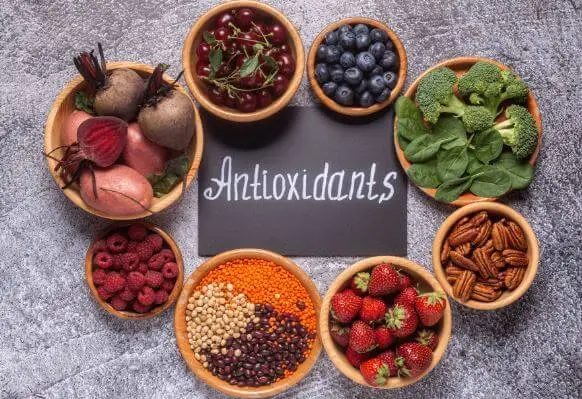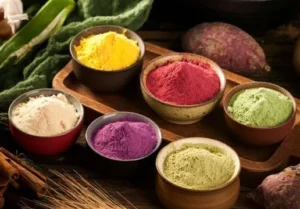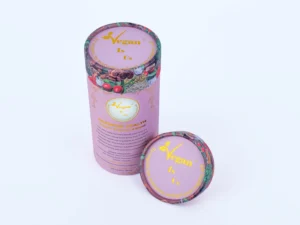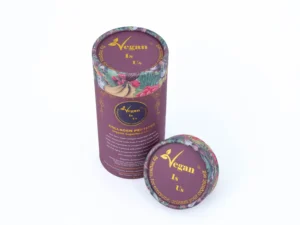How Antioxidants Works: Health Benefits and Why You Need Them
In recent years, the term “antioxidants” has become a buzzword in the health and wellness industry. From skincare products to nature’s best superfoods, antioxidants combat oxidative stress, promote overall health, and even slow down the ageing process. But what exactly are antioxidants, and why do they offer so many benefits? In this blog, we’ll explore the science behind antioxidants, highlight their numerous health benefits, and discuss how you can incorporate them into your daily life, whether you follow a plant-based diet, embrace veganism, or simply want to enjoy the power of superfoods.
What Are Antioxidants?
Antioxidants are molecules that neutralise free radicals, unstable atoms or molecules that damage cells, proteins, and DNA. The body naturally produces free radicals as a byproduct of metabolism, but external sources such as pollution, radiation, cigarette smoke, and certain chemicals also introduce them. When free radicals accumulate, they cause oxidative stress, which links to chronic diseases like cancer, heart disease, and neurodegenerative disorders such as Alzheimer’s.
Antioxidants work by donating an electron to free radicals, stabilising them and preventing damage. They come in various forms, including vitamins (such as vitamin C and vitamin E), minerals (like selenium and zinc), and phytochemicals (found in plants). Some of the most well-known antioxidants include beta-carotene, lycopene, flavonoids, and polyphenols, many of which are abundant in nature’s best offerings like berries, leafy greens, and nuts.
The Health Benefits of Antioxidants
1. Reducing Oxidative Stress
Oxidative stress occurs when there is an imbalance between free radicals and antioxidants in the body. This imbalance can lead to cellular damage, inflammation, and an increased risk of chronic diseases. Antioxidants help to restore this balance by neutralising free radicals, thereby reducing oxidative stress and its harmful effects. For those following a plant-based diet or embracing veganism, antioxidant-rich foods like fruits, vegetables, and nuts are essential for maintaining this balance.
2. Boosting Immune Function
A strong immune system is essential for fighting off infections and diseases. Antioxidants, particularly vitamin C and vitamin E, play a crucial role in supporting immune function. Vitamin C, for example, stimulates the production of white blood cells, which are vital for combating pathogens. Additionally, antioxidants help to protect immune cells from oxidative damage, ensuring that they function optimally. Vegan superfoods like citrus fruits, bell peppers, and spinach are excellent sources of these immune-boosting antioxidants.
3. Protecting Heart Health
Heart disease is one of the leading causes of death worldwide, and oxidative stress significantly contributes to its development. Antioxidants, such as flavonoids and polyphenols found in fruits, vegetables, and tea, improve heart health by reducing inflammation, lowering blood pressure, and preventing the oxidation of LDL cholesterol (often called “bad” cholesterol). Oxidised LDL cholesterol forms plaques in the arteries, increasing the risk of heart attacks and strokes. A plant-based diet rich in antioxidant-packed foods like berries, nuts, and dark leafy greens significantly supports cardiovascular health.
4. Supporting Brain Health
The brain is particularly vulnerable to oxidative stress due to its high oxygen consumption and the presence of unsaturated fatty acids, which are prone to oxidation. Antioxidants, such as vitamin E and flavonoids, have been shown to protect brain cells from oxidative damage, potentially reducing the risk of neurodegenerative diseases like Alzheimer’s and Parkinson’s. Additionally, some studies suggest that antioxidants may improve cognitive function and memory, particularly in older adults. Nature’s best brain-boosting foods include walnuts, blueberries, and dark chocolate, all of which are staples in a vegan or plant-based diet.
5. Promoting Skin Health
The skin constantly faces environmental factors such as UV radiation, pollution, and toxins, all of which generate free radicals and lead to oxidative stress. This results in premature ageing, wrinkles, and a higher risk of skin cancer. Antioxidants, particularly vitamin C and vitamin E, are essential for maintaining healthy skin. They neutralise free radicals, reduce inflammation, and promote collagen production, which is necessary for skin elasticity and firmness. Additionally, antioxidants protect the skin from UV damage, reducing the risk of sunburn and skin cancer. Vegan superfoods like avocados, sweet potatoes, and almonds are excellent for promoting radiant, healthy skin.
6. Reducing the Risk of Cancer
Cancer is a complex disease characterised by the uncontrolled growth and spread of abnormal cells. Oxidative stress and DNA damage are key factors in the development of cancer. Antioxidants help to protect cells from oxidative damage, reducing the risk of mutations that can lead to cancer. Additionally, some antioxidants, such as beta-carotene and lycopene, have been shown to inhibit the growth of cancer cells and promote apoptosis (programmed cell death) in certain types of cancer. A plant-based diet rich in colourful fruits and vegetables, such as carrots, tomatoes, and kale, can provide a powerful defence against cancer.
7. Supporting Eye Health
The eyes are also susceptible to oxidative stress, particularly the retina, which is rich in polyunsaturated fatty acids. Antioxidants such as lutein and zeaxanthin, found in leafy green vegetables and eggs, are essential for maintaining eye health. They protect the eyes from oxidative damage caused by UV light and blue light, reducing the risk of age-related macular degeneration (AMD) and cataracts. For those following a vegan lifestyle, spinach, kale, and other leafy greens are excellent sources of these eye-protecting antioxidants.
8. Improving Exercise Performance
Exercise increases the production of free radicals, which can lead to muscle fatigue and delayed recovery. Antioxidants, particularly vitamin C and vitamin E, reduce exercise-induced oxidative stress, improve muscle recovery, and enhance overall exercise performance. Additionally, antioxidants may reduce inflammation and muscle soreness after intense physical activity. Nature’s best post-workout snacks include antioxidant-rich options like oranges, almonds, and chia seeds.
9. Supporting Liver Health
The liver detoxifies the body and metabolises various substances, making it particularly vulnerable to oxidative stress. Antioxidants, such as glutathione and N-acetylcysteine (NAC), support liver health by neutralising free radicals and promoting detoxification. Additionally, antioxidants reduce inflammation and prevent liver damage caused by alcohol, drugs, and environmental toxins. A plant-based diet rich in cruciferous vegetables like broccoli and Brussels sprouts supports liver function.
10. Promoting Longevity
Oxidative stress is one of the primary drivers of ageing, as it leads to cellular damage and a decline in organ function over time. By reducing oxidative stress, antioxidants slow down the ageing process and promote longevity. Some studies even suggest that a diet rich in antioxidants increases lifespan and reduces the risk of age-related diseases. Embracing a vegan or plant-based diet filled with antioxidant-rich foods is a natural way to support a long, healthy life.
How to Incorporate Antioxidants into Your Diet
Now that we’ve explored the numerous benefits of antioxidants, you may wonder how to incorporate them into your daily life. The good news is that antioxidants are found in a wide variety of foods, making it easy to boost your intake through a balanced diet. Here are some tips for incorporating more antioxidants into your meals, whether you follow a plant-based diet, embrace veganism, or simply want to enjoy nature’s best offerings:
1. Eat a Rainbow of Fruits and Vegetables
Fruits and vegetables are some of the richest sources of antioxidants. To ensure you get a wide range of antioxidants, aim to eat a variety of colourful fruits and vegetables each day. Some of the best options include:
- Berries: Blueberries, strawberries, raspberries, and blackberries are packed with antioxidants such as vitamin C, flavonoids, and anthocyanins.
- Leafy Greens: Spinach, kale, and Swiss chard are rich in antioxidants like vitamin C, vitamin E, and beta-carotene.
- Citrus Fruits: Oranges, lemons, and grapefruits are high in vitamin C, a powerful antioxidant that supports immune function and skin health.
- Cruciferous Vegetables: Broccoli, cauliflower, and Brussels sprouts contain antioxidants such as sulforaphane, which has anti-cancer properties.
- Brightly Coloured Vegetables: Carrots, sweet potatoes, and bell peppers are rich in beta-carotene, an antioxidant that supports eye health and immune function.
2. Include Nuts and Seeds
Nuts and seeds are excellent sources of antioxidants, particularly vitamin E and selenium. Some of the best options include:
- Almonds: Almonds are rich in vitamin E, which protects cells from oxidative damage.
- Walnuts: Walnuts contain antioxidants such as polyphenols, which support heart health.
- Flaxseeds: Flaxseeds are high in lignans, a type of antioxidant linked to a reduced risk of cancer.
- Chia Seeds: Chia seeds are packed with antioxidants, including quercetin and kaempferol, which have anti-inflammatory properties.
3. Drink Green Tea
Green tea is one of the healthiest beverages you can consume, thanks to its high concentration of antioxidants called catechins. Catechins reduce inflammation, support heart health, and protect against certain types of cancer. To reap the benefits, aim to drink at least one cup of green tea per day.
4. Use Herbs and Spices
Herbs and spices not only add flavour to your meals but are also packed with antioxidants. Some of the best options include:
- Turmeric: Turmeric contains curcumin, a powerful antioxidant with anti-inflammatory properties.
- Ginger: Ginger is rich in antioxidants such as gingerol, which reduces inflammation and supports digestive health.
- Cinnamon: Cinnamon is high in polyphenols, which improve blood sugar control and heart health.
- Oregano: Oregano is packed with antioxidants, including rosmarinic acid, which has anti-inflammatory and antimicrobial properties.
5. Choose Dark Chocolate
Dark chocolate is not only delicious but also a rich source of antioxidants, particularly flavonoids. Flavonoids support heart health by improving blood flow, reducing blood pressure, and preventing the oxidation of LDL cholesterol. To get the most benefits, choose dark chocolate with at least 70% cocoa content.
6. Consider Antioxidant Supplements
While it’s best to get your antioxidants from whole foods, supplements can be a convenient way to boost your intake, especially if you have a busy lifestyle or dietary restrictions. Some of the most popular antioxidant supplements include:
- Vitamin C: Vitamin C is a powerful antioxidant that supports immune function, skin health, and collagen production.
- Vitamin E: Vitamin E protects cells from oxidative damage and supports heart health.
- Selenium: Selenium is a mineral that acts as an antioxidant and supports thyroid function and immune health.
- Coenzyme Q10 (CoQ10): CoQ10 is an antioxidant that plays a crucial role in energy production and heart health.
However, supplements should not replace a balanced diet, and it’s always best to consult with a healthcare professional before starting any new supplement regimen.
The Role of Antioxidants in Skincare
In addition to their internal benefits, antioxidants also play a crucial role in skincare. The skin is the body’s largest organ and constantly faces environmental stressors such as UV radiation, pollution, and toxins, all of which generate free radicals and lead to oxidative stress. This results in premature ageing, wrinkles, and a higher risk of skin cancer.
Antioxidants, particularly vitamin C and vitamin E, are essential for maintaining healthy skin. They neutralise free radicals, reduce inflammation, and promote collagen production, which is necessary for skin elasticity and firmness. Additionally, antioxidants protect the skin from UV damage, reducing the risk of sunburn and skin cancer.
Some of the best antioxidant-rich skincare ingredients include:
- Vitamin C: Vitamin C brightens the skin, reduces hyperpigmentation, and promotes collagen production.
- Vitamin E: Vitamin E protects the skin from oxidative damage and supports skin barrier function.
- Green Tea Extract: Green tea extract is rich in catechins, which have anti-inflammatory and antioxidant properties.
- Resveratrol: Resveratrol is a polyphenol found in grapes and red wine that protects the skin from oxidative stress and reduces the signs of ageing.
- Niacinamide: Niacinamide, also known as vitamin B3, reduces inflammation, improves skin texture, and supports the skin barrier.
When choosing skincare products, look for those that contain a combination of antioxidants to provide comprehensive protection against oxidative stress.
The Key Takeaways
Antioxidants are essential for maintaining overall health and well-being. They neutralise free radicals, reduce oxidative stress, and protect against a wide range of chronic diseases. By incorporating antioxidant-rich foods into your diet—whether you follow a plant-based diet, embrace veganism, or enjoy nature’s best superfoods—you can support your body’s natural defences and promote long-term health. Remember, the key to reaping the benefits of antioxidants is to consume a varied and balanced diet that includes a wide range of fruits, vegetables, nuts, seeds, and other antioxidant-rich foods. Additionally, adopting a healthy lifestyle that includes regular exercise, stress management, and adequate sleep plays a crucial role in reducing oxidative stress and promoting overall health.
In conclusion, antioxidants are a powerful tool in the fight against oxidative stress and chronic disease. By understanding their benefits and incorporating them into your daily life, you can take proactive steps towards improving your health and well-being. So, the next time you reach for a snack or choose a skincare product, consider the antioxidant content and make choices that support your body’s natural defences. Your future self will thank you!







